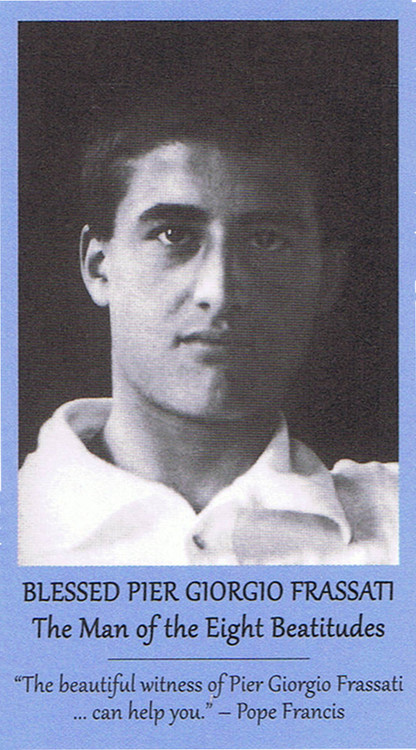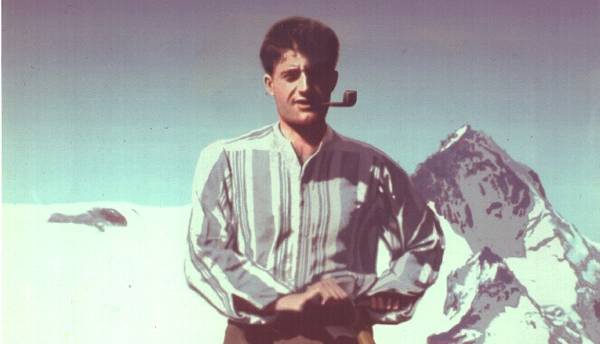Because
of the death of Pope Francis in May, the canonizations of both Blessed Carlo
Acutis and Blessed Pier Giorgio Frassati were postponed, and now are scheduled
together for September 7th. Of
the two, the one closer to my heart is Bl. Pier Giorgio.
Born
in 1901 to a wealthy family that was not particularly devout, Pier Giorgio
defying expectations became devout as a child and continued into adulthood. He became a Lay Dominican, secretly helped
the poor, and continuously evangelized both by example and by
conversation. He started religious
associations and politically supported the Catholic social doctrine. He went to school to become a mining engineer
where his ambition was to help the poor, hardworking miners. He loved reading the Bible, Catholic
theology, and literature. You can see
how many commonalities I have with him to make him endearing to me.
He
was an outdoorsman and a mountain climber, and one of his favorite expressions
was "Verso l'alto.” which means to “toward the top.” There is a pun there with the literal meaning
to climb to the top of the mountain while the analogous meaning being to climb
to heaven. Pope St. John Paul II dubbed
him the “Man of the Beatitudes” because he embodied them all. He was at the center of a wonderful group of
friends who he loved, spiritually guided, and enjoyed coordinating activities
and fun. To some he has been mentioned
as the patron saint of friendship. I
certainly treat him as such and entrust in him the spiritual wellbeing of all
my friends.
Pier
Giorgio died young at the age of 24. He
contracted polio by being in the company of needy people and died after a very
short period. His day of passing was on
July 4th, 1925, which means that this will be the 100th anniversary
of his passing.
You
can read much more about him and his life at the website devoted to him, Frassati.
On
the website you will find a novena prayer, and if you start the novena on
Wednesday, June 25th—tomorrow as per the posting of this piece—you will
finish the ninth day on July 3rd, and final tenth on his feast day,
July 4th. The novena fittingly
centers on the beatitudes. Here is the novena.
Day
1
Jesus says: “Blessed are
the poor in spirit, for theirs is the kingdom of heaven.”
Pier Giorgio responds:
“The faith given to me in Baptism surely suggests to me that of yourself you
will do nothing; but if you have God as the center of all your actions, then
you will reach the goal.”
We pray: Blessed Pier
Giorgio, teach me true poverty of spirit. Help me understand that God cares for
me; and that He asks me, in return, to care for others, especially those in
need. Guide me to make choices in my life which will show a preference for
service of God and neighbor, rather than accumulating financial wealth and
social advantage for myself. Give me a special love for the poor and the sick.
(Repeated each day)
Blessed Pier Giorgio, I
ask for your intercession in obtaining from God, Who is the Lover of the poor,
all the graces necessary for my spiritual and temporal welfare. I confidently
turn to you for help in my present need: (mention your request.) (Repeated each day)
Day
2
Jesus says: “Blessed are
those who mourn, for they shall be comforted.”
Pier Giorgio responds:
“Our life, in order to be Christian, has to be a continual renunciation, a
continual sacrifice. But this is not difficult, if one thinks what these few years
passed in suffering are, compared with eternal happiness where joy will have no
measure or end, and where we shall have unimaginable peace.”
Repeat the last two
paragraphs.
Day
3
Jesus says: “Blessed are
the meek, for they shall inherit the earth.”
Pier Giorgio responds:
“With violence you sow hatred, and you harvest its bad fruits. With charity,
you sow peace among men – not the peace that the world gives, but the true
peace that only faith in Jesus Christ can give us in common brotherhood.”
Repeat the last two
paragraphs.
Day
4
Jesus says: “Blessed are
those who hunger and thirst for righteousness, for they shall be satisfied.”
Pier Giorgio responds:
“What wealth it is to be in good health, as we are! But we have the duty of
putting our health at the service of those who do not have it. To act otherwise
would be to betray that gift of God.”
Repeat the last two
paragraphs.
Day
5
Jesus says: “Blessed are
the merciful, for they shall obtain mercy.”
Pier Giorgio responds:
“St. Paul says that “the charity of Christ urges us.” Without this flame, which
should burn out our personality little by little and blaze only for other
people’s griefs, we would not be Christian, let alone Catholic.”
Repeat the last two
paragraphs.
Day
6
Jesus says: “Blessed are
the pure in heart, for they shall see God.”
Pier Giorgio responds: “I
beg you to pray for me a little, so that God may give me an iron will that does
not bend and does not fail in His projects.”
Repeat the last two
paragraphs.
Day
7
Jesus says: “Blessed are
the peacemakers, for they shall be called children of God.”
Pier Giorgio responds: “I
offer you my best wishes – or, rather, only one wish, but the only wish that a
true friend can express for a dear friend: may the peace of the Lord be with
you always! For, if you possess peace every day, you will be truly rich.”
Repeat the last two
paragraphs.
Day
8
Jesus says: “Blessed are
those who are persecuted for righteousness’ sake, for theirs is the kingdom of
heaven.”
Pier Giorgio responds:
“To live without faith, without a patrimony to defend, without a steady
struggle for truth – that is not living, but existing.”
Repeat the last two
paragraphs.
Day
9
Jesus says: “Blessed are
you when they revile you and persecute you and utter all kinds of evil against
you falsely on My account. Rejoice and be glad, for your reward is great in
heaven.”
Pier Giorgio responds:
“We who by the grace of God are Catholics must steel ourselves for the battle
we shall certainly have to fight to fulfill our program and to give our
country, in the not too distant future, happier days and a morally healthy
society. But to achieve this we need constant prayer to obtain from God that
grace without which all our powers are useless.”
Repeat the last two
paragraphs.
On
the tenth day, it is recommended you pray the Litany of Bl. Pier Giorgio
Frassati.
Lord, have mercy. Lord,
have mercy.
Christ, have mercy.
Christ, have mercy.
Lord, have mercy. Lord,
have mercy.
God our Father in heaven,
have mercy on us.
God the Son, Redeemer of
the world, have mercy on us.
God the Holy Spirit, have
mercy on us.
Holy Trinity, One God,
have mercy on us.
Holy Mary, pray for us.
All the angels and
saints, pray for us.
Blessed Pier Giorgio,
pray for us. (Repeat after each invocation.)
Loving son and brother,
Support of family life,
Friend of the friendless,
Most Christian of
companions,
Leader of youth,
Helper of those in need,
Teacher of charity,
Patron of the poor,
Comfort of the sick,
Athlete for God’s
kingdom,
Conqueror of life’s
mountains,
Defender of truth and
virtue,
Opponent of every
injustice,
Patriotic citizen of the
nation,
Loyal son of the Church,
Devoted child of the
Madonna,
Ardent adorer of the
Eucharist,
Fervent student of the
Scriptures,
Dedicated follower of St.
Dominic,
Apostle of prayer and
fasting,
Guide
to a deep love for Jesus,
Diligent in work and
study,
Joyful in all of life’s
circumstances,
Strong in safeguarding
chastity,
Silent in pain and
suffering,
Faithful to the promises
of Baptism,
Model of humility,
Example of detachment,
Mirror of obedience,
Man of the Beatitudes,
Lamb of God, You take
away the sins of the world, have mercy on us.
Lamb of God, You take
away the sins of the world, have mercy on us.
Lamb of God, You take
away the sins of the world, have mercy on us.
Pray for us, Blessed Pier
Giorgio Frassati, That we may be made worthy of the promises of Christ.
Let us pray: Father, You
gave to the young Pier Giorgio Frassati the joy of meeting Christ and of living
his faith in service of the poor and the sick. Through his intercession, may
we, too, walk the path of the Beatitudes and follow the example of his generosity,
spreading the spirit of the Gospel in society. We ask this through Christ our
Lord. Amen.
Our
entire Province of Lay Dominicans have been asked to pray this novena this week. You don’t have to be a Lay Dominican to pray
it. If you want to entrust your friends
to a patron saint of friendship, I think it would be a good idea.
Blessed
Pier Giorgio Frassati pray for us.







